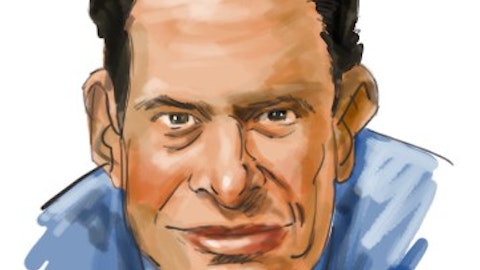And to the extent that those prices materialize, we’re going to have a significant effect or not, right? In lower price environment, the impact is minimal. In higher price environments, there is going to be a cash effect but you need to consider that versus the incremental cash flows that the companies are going to receive anyway associated to the increased earnings associated to that price environment. So that’s the way we look at it. The other effect, which is royalties we think, it’s a relatively marginal. It’s relatively marginal. Effectively, what is going to occur is that a cost of production, which are currently being deducted from the tax baseline from the earnings baseline are no longer going to be able to be deducted, right? It’s not the commercial cost that is associated to these volumes.
It’s certainly not the total earnings that the government gets from it. As in earlier versions of the reform, it’s only the cost of production. So we believe that probably is not going to be as material as initially estimated. I’m going to go ahead and give you some estimates that I shared in the previous call that we did in Spanish for the benefit of the audience and to make sure that everybody has the same information. And ultimately, when you take this to a tax effective rate, the way that we are looking at, it is that currently in the Ecopetrol Group we have a tax effective rate that is around 33%. If we think in terms of ranges, you can think about a nominal tax rate of 35%, right? So when you think about a world under this tax reform in a high price environment we’re going to have a surcharge of up to 15%.
So that’s going to take that 33%, 35% to 48%, 50% on the basis of the surcharge. And on top of that, we think that the change in the methodology around royalties may add somewhere between 2% to 5% of additional points of that tax effective rate. That’s how we think about it and that’s how we’re modeling it at this stage. I do want to emphasize again that this is closely related to what price environment you are believing, what price environment you are believing. Clearly in the in the near-term when we think about 2023, we continue to see a robust price environment for our commodities. But when you think about it in the long-term, in mid-term and long-term, we don’t believe that and therefore we don’t believe that these tax reform fundamentally changes our valuation of long-term projects.
So I hope this addresses the broader angle around your questions. Thank you.
Operator: Thank you. Our next question comes from Barbara Halberstadt from JPMorgan. Please go ahead.
Barbara Halberstadt: Hi. Good morning. Thank you for the opportunity of the question. So I wanted to also follow-up from a comment made earlier on the Spanish call in terms of the refinancing options for 2023, definitely where bonds are trading currently would be a much higher cost of debt for the company. So if I understood correctly, currently the main source of funding could be bank lines. So if that’s the case just wanted to confirm if you’re looking more into local sources or local plus international, and to confirm if that’s the case as well? And also in terms of the FEPC balance, I think we had an expectation that it could end a year around COP27 trillion. Just wanted to have an update if you continue to think that’s more or less where you want a year in terms of the outstanding balance for the FEPC.
And if you’re ready to have an estimate for 2023, considering the modest increases in the domestic prices have been applied for gasoline at least. That would be for me. Thank you.




